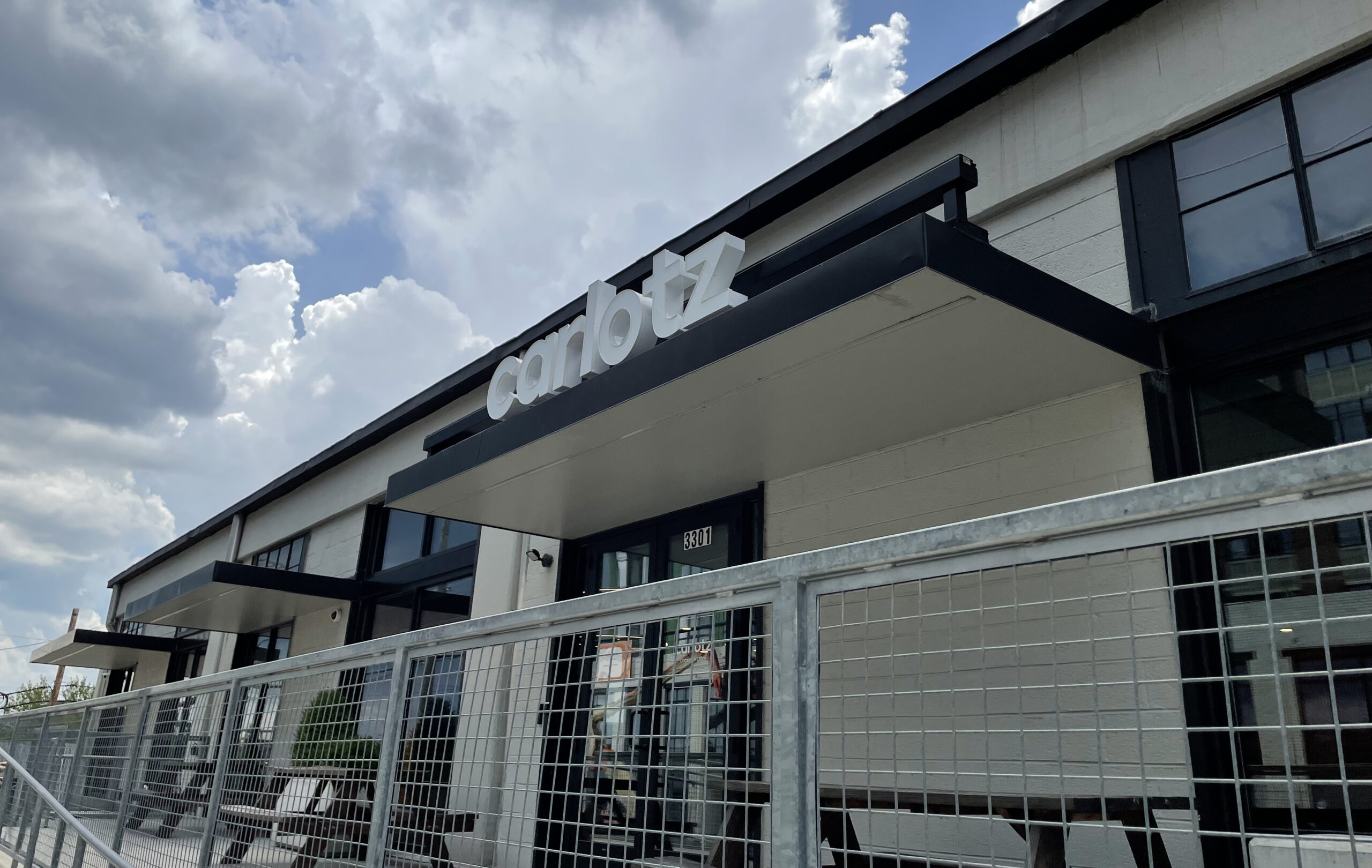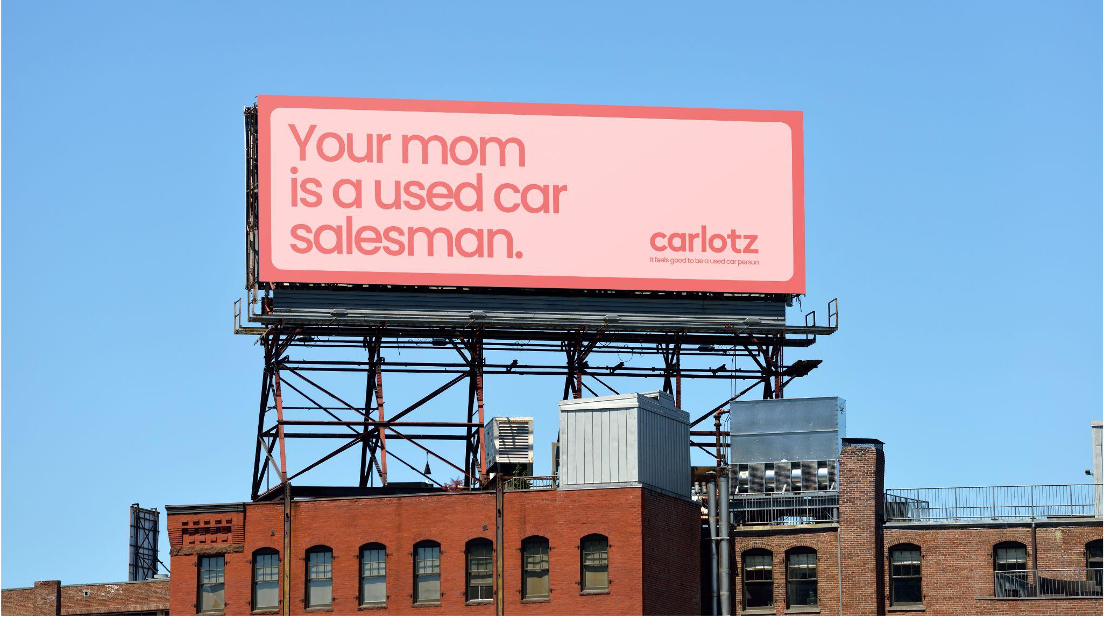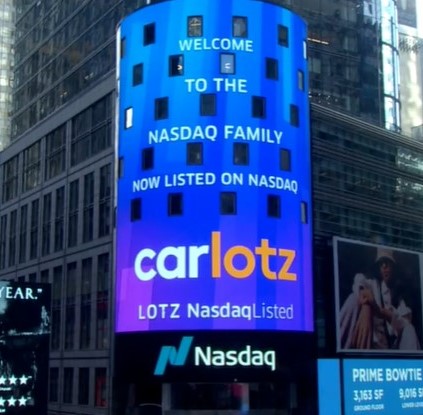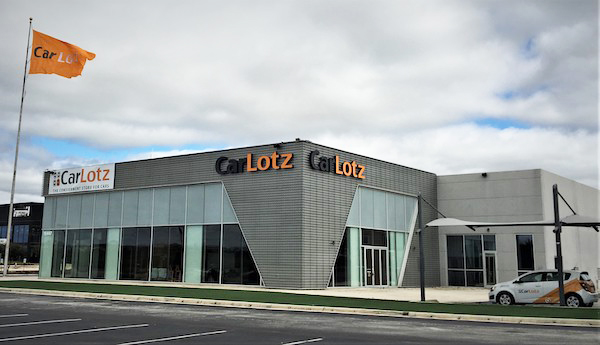
The future of the CarLotz headquarters in Scott’s Addition is up in the air after a merger with San Francisco-based Shift Technologies. (Michael Schwartz photo)
Homegrown used-vehicle retailer CarLotz’s days as a standalone public company look to be numbered.
The struggling Scott’s Addition-based used vehicle retailer, which has faltered in the face of mounting losses, a lagging stock price and the toughest car market in recent memory, announced Tuesday evening its plans to be merged into Shift Technologies out of the West Coast.
As part of the stock-for-stock deal, set to close in the fourth quarter, the combined companies will be based at Shift’s headquarters in San Francisco and will use Shift as the surviving brand.
That means the end of the 10-year-old CarLotz name is imminent and the future of CarLotz’s relatively new Richmond headquarters in the HandCraft building is up in the air.
CarLotz said in regulatory filings that it’s too soon to say how exactly the deal will affect its workforce and its physical locations. Last year it moved its headquarters from Manchester to 20,000 square feet at 3301 W. Moore St.
“We will be evaluating our combined needs over the coming weeks and will provide updates regarding our presence in Central Virginia beyond the hub level,” the company said in filings with SEC. CarLotz refers to its retail locations as “hubs.”
The filings added that CarLotz’s workforce of more than 200 will likely experience some layoffs because of the deal.
“We have not had the time for the Shift and CarLotz teams to thoroughly evaluate the organizational structure for the combined entity,” it stated. “The most difficult part of a merger is that there will be some duplicative roles that will be reconfigured.”
Described as a “merger of equals,” the deal brings together two companies that have a lot in common: some good qualities that were touted in their announcements this week and some they don’t brag about.
Both sell used vehicles, though Shift’s focus is more on online sales, while CarLotz is more centered on transactions at its stores.
Both companies went public through SPAC deals – Shift in 2020 and CarLotz in 2021 – and both have struggled to maintain momentum after their IPOs.
CarLotz stock has been stuck below $1 per share since the spring, prompting a delisting warning from Nasdaq. Its stock value is down about 95 percent from its IPO price. Its shares shot up nearly 18 percent on Wednesday after the announcement, but even that didn’t get it over the $1 mark.
Shift’s stock has had a similar decline, though it has managed to stay above $1 per share, closing Wednesday at $1.30.
Both companies have just gone through CEO transitions. CarLotz founding CEO Michael Bor, a former Richmond investment banker, was replaced earlier this year by Lev Peker. Shift announced Tuesday it will replace co-founder and CEO George Arison with its current president, Jeff Clementz.
Clementz will lead the combined companies, while Peker’s future with the firm hasn’t yet been announced. CarLotz did not respond to questions by press time.
Both companies are in the red.
CarLotz posted a net loss of $35 million in the second quarter and has lost $60 million so far this year. That’s after losses of $40 million in 2021, $6.5 million in 2020 and $12.6 million in 2019.
Shift posted a loss of $52 million for the second quarter and has lost $109 million this year to date. That follows losses of $166 million and $59 million in 2021 and 2020, respectively.
But both companies said in Tuesday’s announcements the deal is expected to combine the two sides’ strengths with the hopes of curing some of those financial woes.
“This decision was made to maximize the futures of both companies,” the companies said. “By merging Shift and CarLotz, we are bringing the best of both companies together for our customers, partners and investors. We have identified synergies and cost savings that will lead to a profitable future without needing additional capital.”
For CarLotz, the deal is expected to accelerate efforts it had already sought in improving its online sales process by being folded into Shift’s already-developed online storefront.
For Shift, CarLotz brings more geographical retail reach, which hasn’t been Shift’s focus. CarLotz said it expects its 11 remaining locations to be part of the combined company. That includes two stores in Richmond. The companies say the CarLotz brand has better reach in the eastern U.S., while Shift is more known out west.
The companies bring sizable combined revenue, with CarLotz posting $76 million in revenue for the second quarter, adding to Shift’s $223 million.
Shift also said CarLotz brings needed cash to the table. Shift said in its latest quarterly filing that there are doubts about its “ability to continue as a going concern,” in part due to its negative cash flow.
“The CarLotz Merger is expected to increase the liquidity available to the combined entity by adding the cash resources of legacy CarLotz to the combined entity and obviating the need for legacy CarLotz to invest in technologies already developed by Shift,” filings state.
Filings state that the deal came together quickly. CarLotz said Shift’s CEO reached out to Peker in mid-July to start discussions.
That was just weeks after CarLotz announced it was closing half of its 22 retail locations in a cost cutting effort, though it said that decision was made before any formal discussions with Shift had started.
As part of the merger, Shift stockholders will own 52.9 percent of the combined company and CarLotz stockholders will own 47.1 percent. CarLotz shareholders will receive 0.69 shares of Shift stock for each of the CarLotz shares. The combined stock will trade on Nasdaq under the symbol SFT.
The new board of directors will be a mix of directors from both companies.
Shift is advised in the merger by Centerview Partners, Cohen & Company Capital Markets and Jenner & Block. CarLotz is advised by William Blair & Co. and Freshfields Bruckhaus Deringer.
The deal must still receive shareholder approval.

The future of the CarLotz headquarters in Scott’s Addition is up in the air after a merger with San Francisco-based Shift Technologies. (Michael Schwartz photo)
Homegrown used-vehicle retailer CarLotz’s days as a standalone public company look to be numbered.
The struggling Scott’s Addition-based used vehicle retailer, which has faltered in the face of mounting losses, a lagging stock price and the toughest car market in recent memory, announced Tuesday evening its plans to be merged into Shift Technologies out of the West Coast.
As part of the stock-for-stock deal, set to close in the fourth quarter, the combined companies will be based at Shift’s headquarters in San Francisco and will use Shift as the surviving brand.
That means the end of the 10-year-old CarLotz name is imminent and the future of CarLotz’s relatively new Richmond headquarters in the HandCraft building is up in the air.
CarLotz said in regulatory filings that it’s too soon to say how exactly the deal will affect its workforce and its physical locations. Last year it moved its headquarters from Manchester to 20,000 square feet at 3301 W. Moore St.
“We will be evaluating our combined needs over the coming weeks and will provide updates regarding our presence in Central Virginia beyond the hub level,” the company said in filings with SEC. CarLotz refers to its retail locations as “hubs.”
The filings added that CarLotz’s workforce of more than 200 will likely experience some layoffs because of the deal.
“We have not had the time for the Shift and CarLotz teams to thoroughly evaluate the organizational structure for the combined entity,” it stated. “The most difficult part of a merger is that there will be some duplicative roles that will be reconfigured.”
Described as a “merger of equals,” the deal brings together two companies that have a lot in common: some good qualities that were touted in their announcements this week and some they don’t brag about.
Both sell used vehicles, though Shift’s focus is more on online sales, while CarLotz is more centered on transactions at its stores.
Both companies went public through SPAC deals – Shift in 2020 and CarLotz in 2021 – and both have struggled to maintain momentum after their IPOs.
CarLotz stock has been stuck below $1 per share since the spring, prompting a delisting warning from Nasdaq. Its stock value is down about 95 percent from its IPO price. Its shares shot up nearly 18 percent on Wednesday after the announcement, but even that didn’t get it over the $1 mark.
Shift’s stock has had a similar decline, though it has managed to stay above $1 per share, closing Wednesday at $1.30.
Both companies have just gone through CEO transitions. CarLotz founding CEO Michael Bor, a former Richmond investment banker, was replaced earlier this year by Lev Peker. Shift announced Tuesday it will replace co-founder and CEO George Arison with its current president, Jeff Clementz.
Clementz will lead the combined companies, while Peker’s future with the firm hasn’t yet been announced. CarLotz did not respond to questions by press time.
Both companies are in the red.
CarLotz posted a net loss of $35 million in the second quarter and has lost $60 million so far this year. That’s after losses of $40 million in 2021, $6.5 million in 2020 and $12.6 million in 2019.
Shift posted a loss of $52 million for the second quarter and has lost $109 million this year to date. That follows losses of $166 million and $59 million in 2021 and 2020, respectively.
But both companies said in Tuesday’s announcements the deal is expected to combine the two sides’ strengths with the hopes of curing some of those financial woes.
“This decision was made to maximize the futures of both companies,” the companies said. “By merging Shift and CarLotz, we are bringing the best of both companies together for our customers, partners and investors. We have identified synergies and cost savings that will lead to a profitable future without needing additional capital.”
For CarLotz, the deal is expected to accelerate efforts it had already sought in improving its online sales process by being folded into Shift’s already-developed online storefront.
For Shift, CarLotz brings more geographical retail reach, which hasn’t been Shift’s focus. CarLotz said it expects its 11 remaining locations to be part of the combined company. That includes two stores in Richmond. The companies say the CarLotz brand has better reach in the eastern U.S., while Shift is more known out west.
The companies bring sizable combined revenue, with CarLotz posting $76 million in revenue for the second quarter, adding to Shift’s $223 million.
Shift also said CarLotz brings needed cash to the table. Shift said in its latest quarterly filing that there are doubts about its “ability to continue as a going concern,” in part due to its negative cash flow.
“The CarLotz Merger is expected to increase the liquidity available to the combined entity by adding the cash resources of legacy CarLotz to the combined entity and obviating the need for legacy CarLotz to invest in technologies already developed by Shift,” filings state.
Filings state that the deal came together quickly. CarLotz said Shift’s CEO reached out to Peker in mid-July to start discussions.
That was just weeks after CarLotz announced it was closing half of its 22 retail locations in a cost cutting effort, though it said that decision was made before any formal discussions with Shift had started.
As part of the merger, Shift stockholders will own 52.9 percent of the combined company and CarLotz stockholders will own 47.1 percent. CarLotz shareholders will receive 0.69 shares of Shift stock for each of the CarLotz shares. The combined stock will trade on Nasdaq under the symbol SFT.
The new board of directors will be a mix of directors from both companies.
Shift is advised in the merger by Centerview Partners, Cohen & Company Capital Markets and Jenner & Block. CarLotz is advised by William Blair & Co. and Freshfields Bruckhaus Deringer.
The deal must still receive shareholder approval.






This is laughable. Early in the article the writer states “the toughest car market in recent memory” – what are you referring to?!? The past 26 months have been the absolute zenith of used car demand, people are paying literally thousands over what vehicles are worth, so if you can’t make money in this market, it is certainly time to move on. Don’t sugar coat it. The majority of these SPAC offerings were junk – free money and low rates produce these kind of non-performing companies.
The tough market likely comes more from the supply side. While it’s easy to sell them, it’s not so easy getting the lot filled with inventory. It’s hard to acheive sustainable scale when you can’t get your hands on product. Look no further than the housing market in 2021 for a similar dynamic.
When should state taxpayers see a refund for the $750,000 that Gov Northam gave them last July to add 192 workers to the Richmond HQ??? After the merger, I doubt they will have duplicate staffers left in RVA as both companies are bleeding cash.
Cautionary tale. Good idea that was initially successful but never anticipated an unexpected upheaval in the broader market. What if overall supply unexpectedly plummets? (rhetorical question)